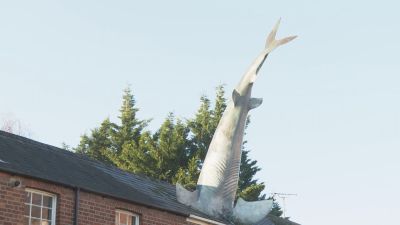Controversial rooftop shark could be protected for the future as part of Oxford heritage plans

A controversial attraction in Headington, Oxford, which features a shark sticking out of the roof of a house, could be protected for future generations.
The iconic sculpture, which was commissioned by the homeowner Bill Heine, back in 1986, has been the talk of the town for more than 30 years.
It was originally deemed "dangerous" by the local council, who battled to have it removed.
Now, years later, the authority wants to preserve Bill's legacy by adding it to the Oxford Heritage Assets Register, but his son, Magnus, has said it goes against the reason it was built.
The Shark is one of 17 on the proposed list, along with a rare surviving example of a late-19th century Temperance Hotel and Bailey Bridge on Port Meadow.
These include the Shark sculpture at 2 New High Street Headington, a 'medieval' wall at The Grates, Cowley and Bailey bridge on Port Meadow. A decision will then be taken as to whether these nominations should be added to the register.
The City Council said a building or place on Heritage Asset Register helps to "influence planning decisions in a way that conserves and enhances local character."
The register was established by Oxford City Council, with funding by Historic England, the Oxford Preservation Trust and local communities.
Magnus Henson-Heine said he's not surprised the shark is still garnering so much attention.
He said he wasn't really aware of the Shark sculpture growing up and said: "It was the status quo and normal for me in a weird way."
Magnus isn't supporting the idea to put it on the Heritage Assets Register, saying it 'doesn't do a good job of preserving it.'
He added, "A large part of the house became about not letting politicians decide that kind of thing, and I think just being able to decide that it can never be removed because they like it now, doesn't really do it justice."
Magnus Henson-Heine
The consultation on whether it should be added to the register ends on Wednesday 26 January 2022.
Councillor Colin Cook, Heritage Champion at Oxford City Council, said: "The Heritage Asset Register helps the Council to understand what makes Oxford such a special place by identifying special buildings, places and features that are not statutorily protected but are greatly valued by local people.
"This means the Council can better protect and manage them through planning policies and planning decisions. We've had some really interesting nominations so far and would like to hear from more people across the city".
The Council would also like to hear about any other potential heritage assets which could be added to the register.